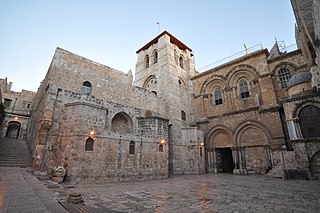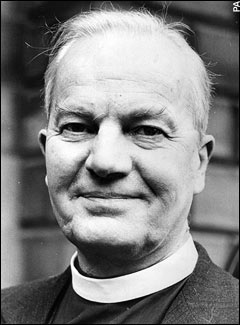
Christianity is an Abrahamic monotheistic religion based on the life and teachings of Jesus. It is the world's largest and most widespread religion with roughly 2.4 billion followers, comprising around 31.2% of the world population. Its adherents, known as Christians, are estimated to make up a majority of the population in 157 countries and territories. Christians believe that Jesus is the Son of God, whose coming as the Messiah was prophesied in the Hebrew Bible and chronicled in the New Testament.
An ecumenical council, also called general council, is a meeting of bishops and other church authorities to consider and rule on questions of Christian doctrine, administration, discipline, and other matters in which those entitled to vote are convoked from the whole world (oikoumene) and which secures the approbation of the whole Church.

The Eastern Orthodox Church, officially the Orthodox Catholic Church, and also called the Greek Orthodox Church or simply the Orthodox Church, is the second-largest Christian church, with approximately 220 million baptised members. It operates as a communion of autocephalous churches, each governed by its bishops via local synods. The church has no central doctrinal or governmental authority analogous to the head of the Catholic Church. Nevertheless, the Ecumenical Patriarch of Constantinople is recognised by them as primus inter pares, a title formerly given to the patriarch of Rome. As one of the oldest surviving religious institutions in the world, the Eastern Orthodox Church has played an especially prominent role in the history and culture of Eastern and Southeastern Europe.

Filioque, a Latin term meaning "and from the Son," was added to the original Nicene Creed, and has been the subject of great controversy between Eastern and Western Christianity. The term refers to the Son, Jesus Christ, with the Father, as the one shared origin of the Holy Spirit. It is not in the original text of the Creed, attributed to the First Council of Constantinople (381), which says that the Holy Spirit proceeds "from the Father" without the addition "and the Son".

The Nicene Creed also called the Creed of Constantinople is the defining statement of belief of Nicene or mainstream Christianity and in those Christian denominations that adhere to it. The original Nicene Creed was first adopted at the First Council of Nicaea in 325. In 381, it was amended at the First Council of Constantinople. The amended form is also referred to as the Nicene Creed, or the Niceno-Constantinopolitan Creed for disambiguation.

Eastern Christianity comprises Christian traditions and church families that originally developed during classical and late antiquity in Western Asia, Asia Minor, Eastern Europe, Southeastern Europe, the Caucasus, Northeast Africa, the Fertile Crescent and the Malabar coast of South Asia, and ephemerally parts of Persia, Central Asia and the Far East. The term does not describe a single communion or religious denomination.

Ecumenism – also called interdenominationalism, or ecumenicalism – is the concept and principle that Christians who belong to different Christian denominations should work together to develop closer relationships among their churches and promote Christian unity. The adjective ecumenical is thus applied to any non-denominational initiative that encourages greater cooperation and union among Christian denominations and churches.
Orthodoxy is adherence to correct or accepted creeds, especially in religion.
A Christian denomination is a distinct religious body within Christianity that comprises all church congregations of the same kind, identifiable by traits such as a name, particular history, organization, leadership, theological doctrine, worship style and, sometimes, a founder. It is a secular and neutral term, generally used to denote any established Christian church. Unlike a cult or sect, a denomination is usually seen as part of the Christian religious mainstream. Most Christian denominations refer to themselves as churches, whereas some newer ones tend to interchangeably use the terms churches, assemblies, fellowships, etc. Divisions between one group and another are defined by authority and doctrine; issues such as the nature of Jesus, the authority of apostolic succession, biblical hermeneutics, theology, ecclesiology, eschatology, and papal primacy may separate one denomination from another. Groups of denominations—often sharing broadly similar beliefs, practices, and historical ties—are sometimes known as "branches of Christianity". These branches differ in many ways, especially through differences in practices and belief.
The East–West Schism, also known as the Great Schism or Schism of 1054, is the ongoing break of communion between the Catholic and Eastern Orthodox churches that began in 1054. A series of ecclesiastical differences and theological disputes between the Greek East and Latin West preceded the formal split that occurred in 1054. Prominent among these were the procession of the Holy Spirit (Filioque), whether leavened or unleavened bread should be used in the Eucharist, the Pope's claim to universal jurisdiction, and the place of the See of Constantinople in relation to the pentarchy.

Thomas Forsyth Torrance, commonly referred to as T. F. Torrance, was a Scottish Protestant theologian and Presbyterian minister. He was a member of the famed Torrance family of theologians. Torrance served for 27 years as professor of Christian dogmatics at New College, in the University of Edinburgh. He is best known for his pioneering work in the study of science and theology, but he is equally respected for his work in systematic theology.
Catholicity is a concept of pertaining to beliefs and practices that are widely accepted by numerous Christian denominations, most notably by those Christian denominations that describe themselves as catholic in accordance with the Four Marks of the Church, as expressed in the Nicene Creed formulated at the First Council of Constantinople in 381: "[I believe] in one, holy, catholic, and apostolic Church." The English adjective catholic is derived from the Ancient Greek adjective καθολικός, meaning "general", "universal". Thus, "catholic" means that in the Church the wholeness of the Christian faith, full and complete, all-embracing, and with nothing lacking, is proclaimed to all people without excluding any part of the faith or any class or group of people. An early definition for what is "catholic" was summarized in what is known as the Vincentian Canon in the 5th century Commonitory: "what has been believed everywhere, always, and by all."
Darryl G. Hart is an American religious and social historian.

In the history of Christianity, the first seven ecumenical councils include the following: the First Council of Nicaea in 325, the First Council of Constantinople in 381, the Council of Ephesus in 431, the Council of Chalcedon in 451, the Second Council of Constantinople in 553, the Third Council of Constantinople from 680–681 and finally, the Second Council of Nicaea in 787. All of the seven councils were convened in what is now the country of Turkey.

Ecumenical meetings and documents on Mary, involving ecumenical commissions and working groups, have reviewed the status of Mariology in the Eastern Orthodox, Protestantism, and Roman Catholic Churches.

The Catholic Church and the Eastern Orthodox Church have been in a state of official schism from one another since the East–West Schism of 1054. This schism was caused by historical and language differences, and the ensuing theological differences between the Western and Eastern churches.

Christianity in late antiquity traces Christianity during the Christian Roman Empire — the period from the rise of Christianity under Emperor Constantine, until the fall of the Western Roman Empire. The end-date of this period varies because the transition to the sub-Roman period occurred gradually and at different times in different areas. One may generally date late ancient Christianity as lasting to the late 6th century and the re-conquests under Justinian of the Byzantine Empire, though a more traditional end-date is 476, the year in which Odoacer deposed Romulus Augustus, traditionally considered the last western emperor.
The history of Eastern Orthodox Christian theology begins with the life of Jesus and the forming of the Christian Church. Major events include the Chalcedonian schism of 451 with the Oriental Orthodox miaphysites, the Iconoclast controversy of the 8th and 9th centuries, the Photian schism (863-867), the Great Schism between East and West, and the Hesychast controversy. The period after the end of the Second World War in 1945 saw a re-engagement with the Greek, and more recently Syriac Fathers that included a rediscovery of the theological works of St. Gregory Palamas, which has resulted in a renewal of Orthodox theology in the 20th and 21st centuries.

Mark David Haverland is an American Continuing Anglican bishop. He is the archbishop and metropolitan of the Anglican Catholic Church (ACC).
Christian devotional literature is religious writing that Christian individuals read for their personal growth and spiritual formation. Such literature often takes the form of Christian daily devotionals. Original excerpts including the Book of Daniel and Leviticus derive from Ancient Roman, Greek and Byzantine culture – and encompass the past relationship of God's Law through the Old Testament. Though these are the most significant accounts, the majority of the literature comprises commentaries to the ever changing social and political reforms of human history – including the impact of censorship, persecution – the reign of Emperor Nero and Diocletian and martyrdom on Christian life through the ages.











